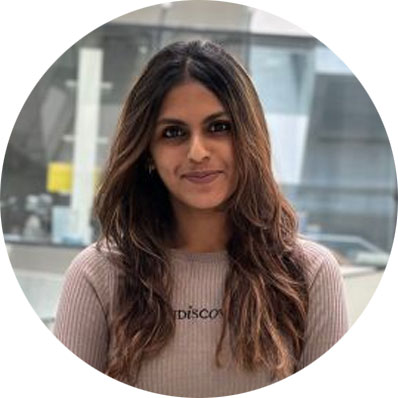
Women’s voices – Anushka Nair
 This month in Women’s Voices, Sara Carracedo interviewes Anushka Nair, a PhD student originally from India working at the IINS in Jonathan Elegheert’s team. In this interview, she shares her academic journey and opinions about some challenges international students can face when working in Europe.
This month in Women’s Voices, Sara Carracedo interviewes Anushka Nair, a PhD student originally from India working at the IINS in Jonathan Elegheert’s team. In this interview, she shares her academic journey and opinions about some challenges international students can face when working in Europe.
Sara Carracedo : Could you start by sharing a bit about your academic journey?
Anushka Nair: I am in the third year of my PhD at the IINS under the supervision of Dr. Jonathan Elegheert. I am originally from India and I completed my formative years of education there. I further pursued an engineering Bachelors in Biotechnology in Mumbai and then obtained a fellowship for the Neurasmus program which allowed me to do the 1st year of my Master’s in Amsterdam and the 2nd year in Bordeaux. From early 2021, I started my PhD project titled “Targeting synaptic proteins and receptors with synthetic Nanobodies”. I am currently in the process of continuing the PhD with a 1-year extension to see the project to fruition.
Could you tell us more about your research and achievement obtained during your PhD?
My PhD project aims to develop molecular tools that will be used to determine iGluR composition and trafficking at the synapse. For this, I am establishing an in vitro synthetic Nanobody (sybody) discovery workflow to discover high-affinity subunit-specific binders. We start with three structurally distinct sybody libraries, each having an initial diversity of 10^12-10^13 unique sequences, which are screened for binders against a target protein by performing a combination of various selection techniques such as ribosome display, phage display and yeast surface display. After the selections, we typically converge upon 10-20 sybodies against the target which are further biophysically, biochemically and structurally characterized. These synthetic binders will then be used to study iGluRs using super resolution microscopy.
During the PhD, I have had the opportunity to present my work at reputed conferences and meet experts in the field from across the globe. I have also had the chance to be part of Women in Science committees, which has given me a platform to share my experiences with other young researchers. Additionally, my experience here has given me the chance to help youth in India who are enthusiastic about the field of neuroscience.
Can you describe the state of neuroscience research and opportunities in your home country (India)? How does it compare to what you have experienced in Europe?
Neuroscience research in India has been expanding steadily and several leading institutions in the country have been focusing on different streams of research such as cognitive neuroscience, computational neuroscience, and clinical neuroscience. Different government organizations, including the Department of Biotechnology (DBT), the Indian Council of Medical Research (ICMR), and the Council of Scientific and Industrial Research (CSIR), are providing substantial funding and various platforms for neuroscience research.
In comparison to Europe, there is still a need for more infrastructure across universities and for talented individuals to pursue research in the country itself.
What challenges did you face in obtaining a visa to study or conduct research in Europe? How did these challenges impact your academic and research plans?
Being a non-EU student, the visa application process was truly a testing period. The documentation required and the necessary approvals took a long time, and this was very stressful since one is in a constant state of uncertainty, until such time that you receive the green signal from respective authorities. Additionally, the process of applying for a research permit for me was during the COVID period, and this complicated matters since I could not travel to India to complete the application and, instead, I had to get everything done in Europe itself. This affected my work in terms of time and energy, since I was required to travel between Belgium, Netherlands and France for the permit and had to be prepared for a situation where my research would be put on hold if I had to travel back to India under immediate circumstances.
In your opinion, how does the difficulty in obtaining visas impact the global eexchange of knowledge and ideas within the neuroscience community? What measures could be implemented to make it easier for international researchers to work in Europe?
I understand the legalities and restrictions that come with visa procedures, however, in my opinion, the time consuming nature of these processes does negatively impact the exchange of knowledge and ideas. It restricts mobility between different labs and thus limits access to resources. Also, time sensitive experiments can be affected, which leads to delayed results and overall lower research productivity.
One of the critical measures I think could help the community would be to have some flexibility in terms of permit or visa deadlines. Additionally, fast tracked methods to expedite approvals would really help, especially for cases where the researcher just needs an extension of a few months or a year to complete their work.
What advice would you give to other early career women from abroad who wish to pursue a PhD in Europe?
Having been in Europe for over 5 years now, I would first highly recommend female researchers to come to Europe and experience the research environment here. I believe the work culture and ethics are very enriching here. The only advice I would give would be to be aware of how the system works and what documentation is required throughout your stay. Having said that, plan your PhD in such a way that you take into account hiccups related to visa processes, so that when such issues arise, your work is not drastically affected.
Women’s Voices is an interview published in Brainstorm and on Neurocampus’ website created in partnership with the Neurocampus Parity and Inclusion Committee (NeuroPIC) a local group committed to promoting equality and organizing actions to close the gap between women and men in academia. The goal of this section is to increase the visibility of early career female researchers at the Bordeaux Neurocampus of the University of Bordeaux. We interview researchers about their scientific contributions, insights and opinions about equity, diversity and gender bias in academia. Through these interviews, we aim not only to highlight their achievements but also to serve as inspiration for our scientific community and other female scientists.
Last update 29/04/25
